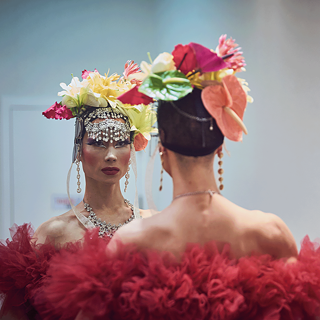55 years of Stonewall:
Looking both back and forward
Please introduce yourself.
Hello. My name is More and I live in Ilyeong-ri, a part of Yangju in the South Korean province of Gyeongi-do. More is pronounced “Mo-eo” in Korean and is made up of the syllables “Mo(毛)” for “hair” and “Eo(魚)” for “fish”: a “hairy fish”.
“I wanted to be a Ballerina. Not a Ballerino ...” When you were studying ballet, you are said to have hoped for a career as a ballet dancer. What were your school and university years like, and what made you decide to become a drag queen?
My early childhood was marred by violence. When I began expressing my “femininity,” I faced name-calling and physical aggression from others because I was different. This made that crucial time very painful for me.
The cycle of violence persisted during my school years. During an induction session for new students, an older classmate berated me to abandon my femininity and forcefully slapped me across the face. I was thrown into a corner of the National Theater of Korea (back then dance school of Korea National University of Arts) and landed on the floor. At that moment, I felt like I should vanish from this world and even contemplated ending my life.
To cope, I sought refuge in a place called Itaewon. The day I first wore high heels and a wig, I felt a sense of relief. From then on, I began wearing heavier makeup. Although I felt lost in the clubs of Itaewon and didn't know where to turn, I found joy in dancing. This marked my transition away from ballet and the beginning of my journey as a drag queen.
Two performances must have been special for you too: “13 Fruitcakes”, which you performed in 2019 to mark the 50th anniversary of the Stonewall riots at the New York theater La MaMa, and the solo performance “More”, with which you were the first drag queen to perform at the Korean National Museum of Modern and Contemporary Art (MMCA) in 2020. Can you tell us more about it? Also about other performances that you remember.
It was my first time in New York. When I arrived in June 2019, rainbow flags were flying everywhere - on the streets, buildings, and restaurants. The entire city was bathed in rainbow colors. The USA has a short history, so they seemed to be very proud of the 50 years since the Stonewall Uprising. (In US history, 50 years is a long time.)
“13 Fruitcakes” is a play that portrays the lives of 13 queer celebrities and was directed by Brian Byungkoo Ahn. The music for the play was composed by Gihieh Lee, featuring texts by historical figures such as Walt Whitman, Oscar Wilde, and Rimbaud, who were part of sexual minority groups. I portrayed the character of Orlando, based on the main character from Virginia Woolf's novel of the same name, published in 1929, who undergoes gender transformations over 400 years. Throughout the play, I performed various scenes, including dancing ballet as a black swan for the composer Tchaikovsky, performing a Korean dance with "jijeon" (paper wagons symbolizing banknotes in Korean shamanism) for the Virginia Woolf scene, and portraying Roosevelt holding the Universal Declaration of Human Rights for the Eleanor Roosevelt scene. My role encompassed being a medium, connecting with the souls of the deceased, and guiding the audience through the play's 13 vignettes, each featuring different genres of music and appearances.
To have the opportunity to perform at La MaMa Theatre in Manhattan's East Village, where legendary actors like Robert De Niro and Al Pacino have graced the stage in its 60-year history, was truly an honor!
The other piece was the performance “More”, a co-production by Korean artist Kang Seung Lee, who was invited to the Venice Biennale in 2024, with me as a drag artist. It was a solo performance that combined drag, dance, and ballet, addressing themes such as queerness, drag, and the performativity of gender. Taking place in the MMCA, a public space, and having a drag queen perform a one-hour solo piece made me feel like I had finally evolved from a drag queen on the fringes of society to an artist who could carve something out of that fringe.
I aimed to create a performance that was my very own genre, a piece of theater that combined elements deeply rooted in my identity: Ballet, drag, and burlesque. Luckily, it turned out to be a very high-quality performance, and I was happy with myself. Unfortunately, the performance could only be streamed live on YouTube at the time due to the coronavirus pandemic. Nevertheless, this performance meant a lot to me.
In my book “More: A Hairy Fish”, I wrote: "I wear high heels in low places and ballet shoes in high places." For example, if low places represent Itaewon, drag, or underground culture, then high places represent the MMCA, dance, and mainstream.
In your book “More: A Hairy Fish (털 난 물고기 모어)” and your autobiographical documentary ‘I am More (모어. I am More)’, you are joined by three other main characters: Your parents and your husband, Zhenya (Evgeny Shtefan). What do these three people mean to you?
Being my parents' child was an incredible blessing. Without their love, I would have given up on life long ago. If they hadn't accepted me as I was, I would still be living an unhappy life full of tears or no longer be in this world.
At the 2019 performance of “13 Fruitcakes” in New York, the choreographer said to me: “Your life is very special.” Even in this day and age, people usually want to discourage someone who wants to study ballet with all their power because it's such a difficult path. But in the past, sending a boy to ballet in the countryside was something very special.
At first, I wasn't quite sure what the choreographer meant by that. It was only when my documentary was published that I was able to understand it. It was only when I saw my story on the screen that I was able to look at my life objectively.
When I first told my parents that I wanted to dance ballet, they never once scolded me or forced me to do anything else. I think my parents realized from the day I was born that I was very different from other people. My parents always treated me the same. Maybe that was the reason why I cried so much when I watched the movie “I Am More” with them.
My husband is tall and has blue eyes. He resembles what I imagined as a child when I read the book “Daddy Langbein”. We met in 1998, so we have spent more than half of my life together. My husband's eyes still speak love when he looks at me. How is it possible that nothing has changed? My parents and my husband are like eternal fountains of love for me. Yes, I am truly blessed with happiness.
Recordings of your performances look extremely splendid and colorful. Each of your drag shows has its very own identity. What is special about your performances and what do you want to achieve with your shows?
Firstly, what sets my performances apart is my background in ballet. I don't want to claim that I am extraordinary, but blending mainstream (ballet) with underground culture (drag) creates a truly distinctive aesthetic. Additionally, being born in a remote area of Jeollanam-do province has instilled a unique energy within me.
Previously, I sought beauty in the strange and dark. However, my current preference is for a kind of beauty that stems from inner qualities, as seen in the book "More: A Hairy Fish" and the movie "I am More". My current pursuit is focused on creating something different. Not only has the form of my performances changed, but the underlying themes as well. While I used to convey a message of "The world is hell, and only in death does torment end," my current message is one of "The world is a paradise, and it's important to savor the happiness of life."
This shift reflects a significant change in my life. I now find beauty in things that are universally appreciated. I no longer wish to explore themes that are challenging, bizarre, or fearful to the public. Regardless of what I do, the full spectrum of human experience is interwoven into my performances. My goal now is to inject my unique sense of humor into my shows. I hope that my performances can evoke a range of emotions, making people both laugh and cry.
In Korea, you are called a “living legend among drag queens”, that's how influential you are. Do you feel a certain responsibility because of your fame? What else would you like to do?
A legend - that's too much praise.
I just want to live beautifully and confidently as I am until I die. If you look around you, many people couldn't do that. I think many feel a substitute satisfaction or a strong sense of contentment when they see me. It may sound a bit exaggerated, but in this life it may simply be my calling to be myself with my head held high.
Yesterday was like this, today is different, but tomorrow will just be beautiful.
Who will come after you? Can you name an up-and-coming drag queen who is still unknown but will follow in your footsteps?
(Laughs) I'm sorry, but I'm afraid there is no one yet.
Korean society is still very conservative, so I'm extremely cautious at some points for fear of offending you. What views and behavior would you personally like to see from so-called normal (heterosexual) people when dealing with sexual minorities?
We are all only human. I don't want members of sexual minorities to continue to receive special treatment. There's nothing more trite than that. I don't know how much longer we have to talk about how you and I are different. We are all just “people” living hard lives in this day and age.
I would like to end the interview with a few lines I wrote for a reading with musician Lang Lee at the Sejong Cultural Center in 2023.
“Why don't you say that I am your girlfriend ...
I'm not a strange, foreign, or scary being.
I'm just your neighbor who lives her life conscientiously day by day.”
Hello. My name is More and I live in Ilyeong-ri, a part of Yangju in the South Korean province of Gyeongi-do. More is pronounced “Mo-eo” in Korean and is made up of the syllables “Mo(毛)” for “hair” and “Eo(魚)” for “fish”: a “hairy fish”.
“I wanted to be a Ballerina. Not a Ballerino ...” When you were studying ballet, you are said to have hoped for a career as a ballet dancer. What were your school and university years like, and what made you decide to become a drag queen?
My early childhood was marred by violence. When I began expressing my “femininity,” I faced name-calling and physical aggression from others because I was different. This made that crucial time very painful for me.
The cycle of violence persisted during my school years. During an induction session for new students, an older classmate berated me to abandon my femininity and forcefully slapped me across the face. I was thrown into a corner of the National Theater of Korea (back then dance school of Korea National University of Arts) and landed on the floor. At that moment, I felt like I should vanish from this world and even contemplated ending my life.
To cope, I sought refuge in a place called Itaewon. The day I first wore high heels and a wig, I felt a sense of relief. From then on, I began wearing heavier makeup. Although I felt lost in the clubs of Itaewon and didn't know where to turn, I found joy in dancing. This marked my transition away from ballet and the beginning of my journey as a drag queen.
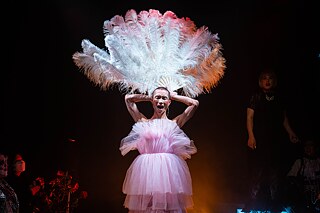
It was my first time in New York. When I arrived in June 2019, rainbow flags were flying everywhere - on the streets, buildings, and restaurants. The entire city was bathed in rainbow colors. The USA has a short history, so they seemed to be very proud of the 50 years since the Stonewall Uprising. (In US history, 50 years is a long time.)
“13 Fruitcakes” is a play that portrays the lives of 13 queer celebrities and was directed by Brian Byungkoo Ahn. The music for the play was composed by Gihieh Lee, featuring texts by historical figures such as Walt Whitman, Oscar Wilde, and Rimbaud, who were part of sexual minority groups. I portrayed the character of Orlando, based on the main character from Virginia Woolf's novel of the same name, published in 1929, who undergoes gender transformations over 400 years. Throughout the play, I performed various scenes, including dancing ballet as a black swan for the composer Tchaikovsky, performing a Korean dance with "jijeon" (paper wagons symbolizing banknotes in Korean shamanism) for the Virginia Woolf scene, and portraying Roosevelt holding the Universal Declaration of Human Rights for the Eleanor Roosevelt scene. My role encompassed being a medium, connecting with the souls of the deceased, and guiding the audience through the play's 13 vignettes, each featuring different genres of music and appearances.
To have the opportunity to perform at La MaMa Theatre in Manhattan's East Village, where legendary actors like Robert De Niro and Al Pacino have graced the stage in its 60-year history, was truly an honor!
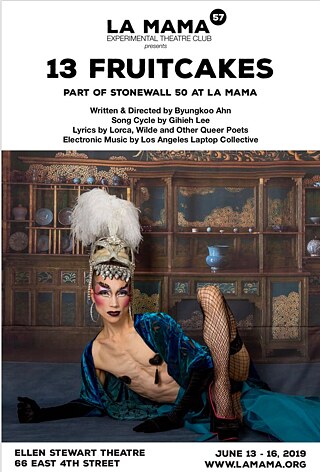
I aimed to create a performance that was my very own genre, a piece of theater that combined elements deeply rooted in my identity: Ballet, drag, and burlesque. Luckily, it turned out to be a very high-quality performance, and I was happy with myself. Unfortunately, the performance could only be streamed live on YouTube at the time due to the coronavirus pandemic. Nevertheless, this performance meant a lot to me.
In my book “More: A Hairy Fish”, I wrote: "I wear high heels in low places and ballet shoes in high places." For example, if low places represent Itaewon, drag, or underground culture, then high places represent the MMCA, dance, and mainstream.
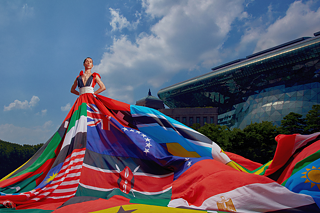
Being my parents' child was an incredible blessing. Without their love, I would have given up on life long ago. If they hadn't accepted me as I was, I would still be living an unhappy life full of tears or no longer be in this world.
At the 2019 performance of “13 Fruitcakes” in New York, the choreographer said to me: “Your life is very special.” Even in this day and age, people usually want to discourage someone who wants to study ballet with all their power because it's such a difficult path. But in the past, sending a boy to ballet in the countryside was something very special.
At first, I wasn't quite sure what the choreographer meant by that. It was only when my documentary was published that I was able to understand it. It was only when I saw my story on the screen that I was able to look at my life objectively.
When I first told my parents that I wanted to dance ballet, they never once scolded me or forced me to do anything else. I think my parents realized from the day I was born that I was very different from other people. My parents always treated me the same. Maybe that was the reason why I cried so much when I watched the movie “I Am More” with them.
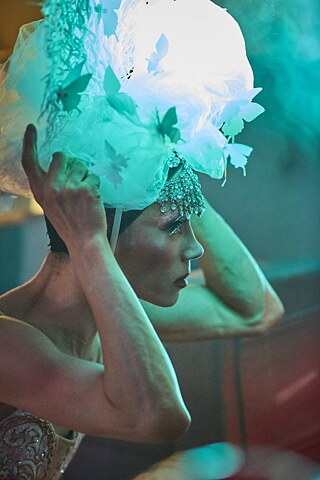
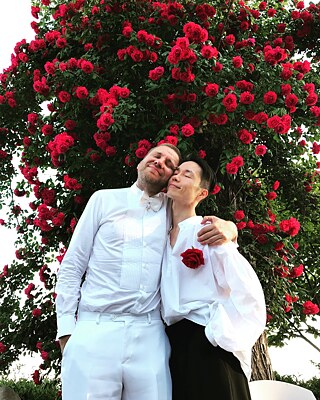
Firstly, what sets my performances apart is my background in ballet. I don't want to claim that I am extraordinary, but blending mainstream (ballet) with underground culture (drag) creates a truly distinctive aesthetic. Additionally, being born in a remote area of Jeollanam-do province has instilled a unique energy within me.
Previously, I sought beauty in the strange and dark. However, my current preference is for a kind of beauty that stems from inner qualities, as seen in the book "More: A Hairy Fish" and the movie "I am More". My current pursuit is focused on creating something different. Not only has the form of my performances changed, but the underlying themes as well. While I used to convey a message of "The world is hell, and only in death does torment end," my current message is one of "The world is a paradise, and it's important to savor the happiness of life."
This shift reflects a significant change in my life. I now find beauty in things that are universally appreciated. I no longer wish to explore themes that are challenging, bizarre, or fearful to the public. Regardless of what I do, the full spectrum of human experience is interwoven into my performances. My goal now is to inject my unique sense of humor into my shows. I hope that my performances can evoke a range of emotions, making people both laugh and cry.
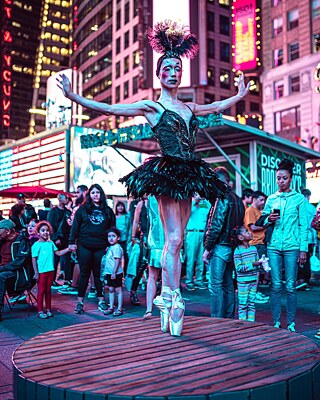
A legend - that's too much praise.
I just want to live beautifully and confidently as I am until I die. If you look around you, many people couldn't do that. I think many feel a substitute satisfaction or a strong sense of contentment when they see me. It may sound a bit exaggerated, but in this life it may simply be my calling to be myself with my head held high.
Yesterday was like this, today is different, but tomorrow will just be beautiful.
Who will come after you? Can you name an up-and-coming drag queen who is still unknown but will follow in your footsteps?
(Laughs) I'm sorry, but I'm afraid there is no one yet.
Korean society is still very conservative, so I'm extremely cautious at some points for fear of offending you. What views and behavior would you personally like to see from so-called normal (heterosexual) people when dealing with sexual minorities?
We are all only human. I don't want members of sexual minorities to continue to receive special treatment. There's nothing more trite than that. I don't know how much longer we have to talk about how you and I are different. We are all just “people” living hard lives in this day and age.
I would like to end the interview with a few lines I wrote for a reading with musician Lang Lee at the Sejong Cultural Center in 2023.
“Why don't you say that I am your girlfriend ...
I'm not a strange, foreign, or scary being.
I'm just your neighbor who lives her life conscientiously day by day.”
